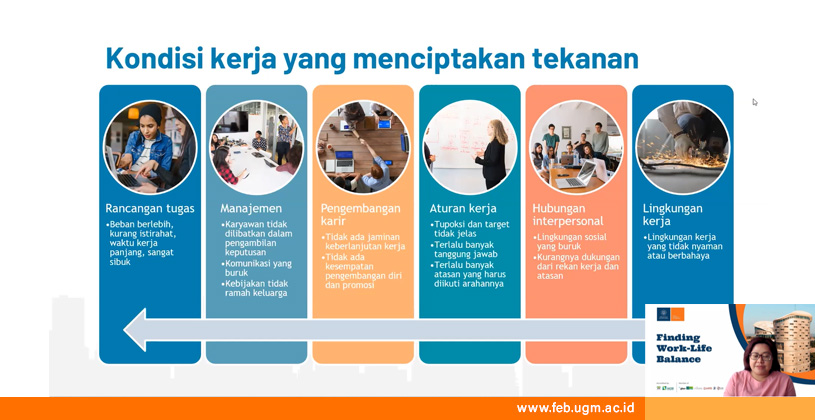The importance of work-life balance for a better life
- Details
- Written by Merisa
- Category: News
- Hits: 1566

On Wednesday (26/10) the Faculty of Economics and Business (FEB) UGM held a human resource development activity for the FEB UGM academic community. This activity was carried out online through zoom meetings with the theme "Finding Work-Life Balance." This event was held with the aim that the academic community can manage their activities to be balanced.
The event began with remarks from the Head of the FEB UGM Administrative Office, Agus Ridwan S.E., M.M., who also opened the webinar. The speaker at this seminar was Edilburga Wulan Saptandari, M.Psi., Ph.D., a psychologist who is familiarly called Yayi as a Psychology Lecturer at Gadjah Mada University. Yayi started sharing session by asking questions to the participants to measure their life balance. In his presentation, Yayi explained that work-life balance was a word used in the late 1970s to describe a balance between one's work and personal life. This can be achieved if a person's right to personal life is accepted and respected by the company and society.
Yayi also explained that a balanced life is not just about balancing work and family. However, how can we gain achievement and also enjoy life? The balance of life includes work, family, self, and social life. She also explained the myth about work-life balance which is perceived as impossible to achieve because we cannot choose it.
In fact, according to Yayi, work-life balance is beneficial for reducing stress and the possibility of experiencing burnout. Stressed employees are more likely to experience depression, anxiety, and physical health problems such as hypertension, diabetes, heart problems, and others. Employees who experience work-life balance will be more motivated, productive, and efficient at work so that they can achieve goals or targets. Yayi explained that several conditions create pressure involving excessive loads so that you don't get enough rest. Such as management that is not good due to employees who are not involved in decision-making that there is no guarantee of continuity of work.
Yayi also explained that there was an identification of the source of stress. The reasons can be from work due to the number of tasks and deadlines, relationships with superiors, co-workers, and subordinates, office politics, to changes in roles. Then, some come from outside of work, namely relationships with spouses and children, financial problems, and too many commitments and roles. Therefore, there are several ways to create a work-life balance, namely by setting a more structured schedule of activities, developing communication, setting routines, knowing when to stop, maintaining social interaction, and taking time off.
Reportage: Merisa Anggraini


